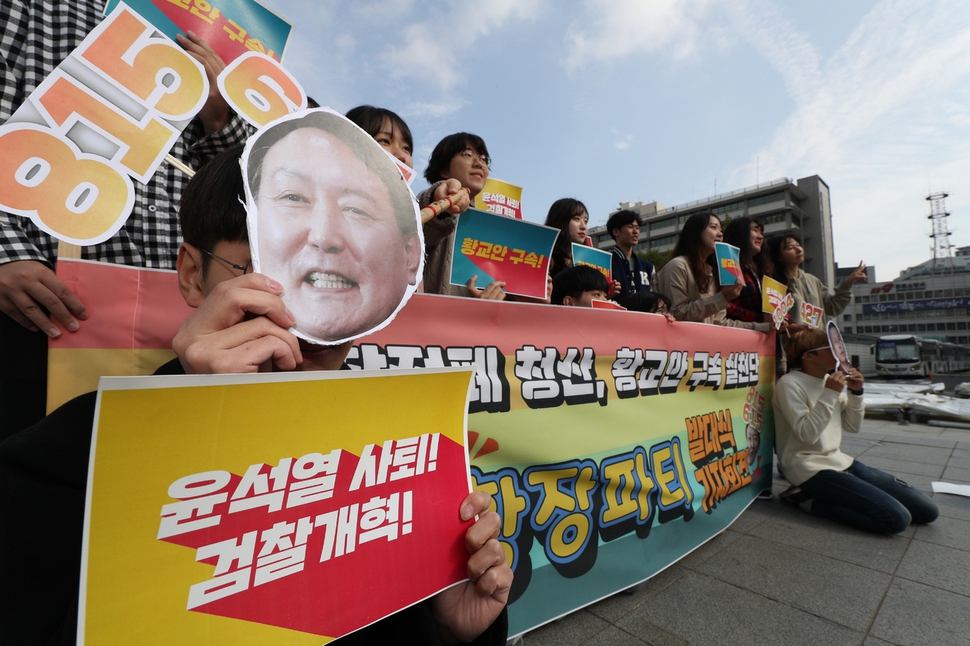 |
|
An association of progressive South Korean university students calls for the resignation of Prosecutor-General Yoon Seok-youl in Seoul’s Gwanghwamun Square on Oct. 14.
|
Moon administration left with task of mustering public support after 2 months of controversy
South Koreans calling for prosecutorial reforms could not conceal their shock after Justice Minister Cho Kuk’s abrupt resignation announcement on the afternoon of Oct. 14. Experts urged civil society and politicians to reflect deeply on the key issues in the debate that has unfolded in South Korea over the 67 days since President Moon Jae-in first nominated Cho for the position on Aug. 9. “Stunned and sad” was how participants in Oct. 5 and 12 candlelight demonstrations for prosecutorial reform in Seoul’s Seocho neighborhood described themselves in an Oct. 14 telephone conversation with the Hankyoreh. “I’m really taken aback. I also don’t see any clear alternatives,” said Kang Gyeong-sik, a 66-year-old photographer. At the same time, participants in the various “Seocho demonstrations” also said they would continue voicing calls for prosecutorial reforms. Namgung Gyeong, a self-employed 48-year-old, said, “The people are united in their wishes, and with Cho Kuk stepping down as the justice minister, the opposition’s rationale for opposing prosecutorial reforms has disappeared.” “I think President Moon can now carry out the prosecution reforms,” Namgung predicted. Park Seong-hwan, a 43-year-old company employee, said, “There might have been more divisions [in public opinion] if the situation had dragged out.” “All the people who took part in candlelight demonstrations are going to calm themselves and watch how the prosecutorial reforms play out,” he said. But those who attended neither the Seocho demonstrations for prosecutorial reform nor the Gwanghwamun rallies for Cho’s resignation said that Cho’s resignation was “late in coming.” “I expected Cho Kuk was going to have to step down as minister at some point, but it was late in the game [when he did],” said Jang Geun-wook, a 27-year-old university student. “This wasteful framing of ‘are we going to protect Cho Kuk or not?’ went on for far too long,” he said. Experts agreed that the “real debate” starts now. The last two months or so have seen South Korean conservatives and progressives at odds, with a heated debate between camps for “democracy” and “progressive values” and generation gaps revealing themselves in nasty criticisms. For that reason, the three groups – the participants in the Seocho and Gwanghwamun demonstrations, and those who took part in neither – are all voicing different positions. “There’s a lot of distrust and hostility bound up in the various issues. It feels like we’re all nervously treading on ground that’s cracked like a spider’s web.” Shin Jin-wook, a sociology professor at Chung-Ang University, has been listening to the debate that has unfolded around Cho for the past two months. According to him, the current situation isn’t one that can be boiled down to a simple “camps” frame. It involves a complex web of issues including Cho’s appointment as the justice minister, support for Moon as president, various conservative factions, the media, and prosecutors. In his view, the ruling party has suffered deep political wounds in the process. “They’ve spent two months frittering away any momentum for pushing reforms in the name of appeasing the public,” he said. Some are arguing the first order of business should be to reflect on young South Koreans’ anger about “social inheritances” among the elite. “There needs to be some reflection on the media’s part [for simply following others blindly],” said Seol Dong-hoon, a sociology professor at Chonbuk National University.
 |
|
Kang Gi-jung (right), senior presidential secretary for political affairs, and Lee hae-chan, leader of the South Korean Democratic Party, following Justice Minister Cho Kuk’s resignation on Oct. 14.
|







